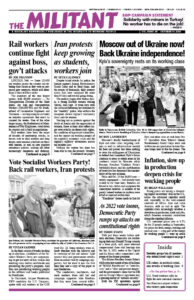Rising prices are having a devastating impact on workers’ lives in the U.S., across the advanced capitalist world and, especially, in the semi-colonial countries of Africa, Asia and Latin America, with no end in sight. The capitalist crisis increasingly involves a slowdown in production, trade and jobs, which threatens economic contraction alongside crippling inflation.
U.S. consumer prices rose to 8.2% for the 12 months ending in September, but prices for food, energy, housing and medical care — a big part of the budget for working people — went up much more. Grocery prices leapt 13% from a year ago, eggs by 30.5%, chicken by 17.2%, and milk by 15.2%.
Health insurance costs rose 28.2% for the year. While gas prices have moderated over the past three months, they’re still 18% higher than a year ago.
Rents surged at the fastest pace in over three decades. Nationwide, rents are now 20% higher than they were in early 2020. Average home mortgage rates Oct. 13 rose to 6.92%, a 20-year high.
And government “specialists,” the Wall Street Journal reported Oct. 16, say the cost of heating a home with natural gas this winter will jump 28%.
This reality puts getting a home and starting a family out of reach for many young workers.
With millions of working people already living paycheck to paycheck, these price hikes tighten the squeeze. Some workers have succeeded in winning wage increases by striking — from union teachers in Minneapolis to grocery workers in Colorado. But most workers are losing ground. Real wages declined in September by 3.8% from last year, the Bureau of Labor Statistics reports.
“The labor movement needs to fight for a sliding scale of wages — escalator clauses in every contract, Social Security and all benefits, so whenever prices rise our wages go up automatically,” said Lea Sherman, Socialist Workers Party candidate for Congress from New Jersey. “And we need a sliding scale of hours — 30 hours work for 40 hours pay — to prevent layoffs by spreading work around as production slows.”
On the same day that September inflation figures were released, the government announced Social Security benefits would increase 8.7% in 2023. But this raise won’t cover the bite of inflation. The announcement was combined with a threat by officials that Social Security will run dry in 10 to 11 years. Unlike the imperialist war budget, the capitalist rulers view it as optional.
Slowing trade, production
The World Trade Organization projects a slowdown in global trade. During August exports of U.S. goods dropped 0.3%, and imports fell by 1.5%.
Factories around the world report a decline in new orders from companies abroad. In China, the second-largest economy after the U.S., an export boom that was one of the bright spots for capitalist investment and profits for decades is petering out.
There’s a big drop in cement production in China, where construction starts have declined at an annual rate of over 40% every month since April. This has affected worldwide cement output, which fell 8% in the first six months of 2022.
Federal Reserve Chairman Jerome Powell acknowledged the central bank has “a record of failed attempts to get inflation under control.” He also said there is simply no “painless way” under capitalism to stop soaring prices.
He wasn’t talking about pain for him. His net worth this year is estimated to be $50 million. He’s talking about pain for you and me. In an Oct. 6 interview, Larry Summers, former treasury secretary under the Clinton administration, admitted he saw no way a significant economic downturn could be avoided. He points to worldwide “inflation shock,” concerns about “Chinese economic performance” and “the ongoing war in Ukraine,” saying, “it is difficult to be optimistic about the global prospect.”
“We are unlikely to achieve inflation stability without a recession of a magnitude that would take unemployment toward the 6% range,” he said.
Whatever happens, workers need to use our unions. “It will take building and strengthening our unions and extending solidarity to other workers, like coal miners on strike against Warrior Met Coal in Alabama and Bakery Workers striking Corn Nuts in California,” said Sherman.

